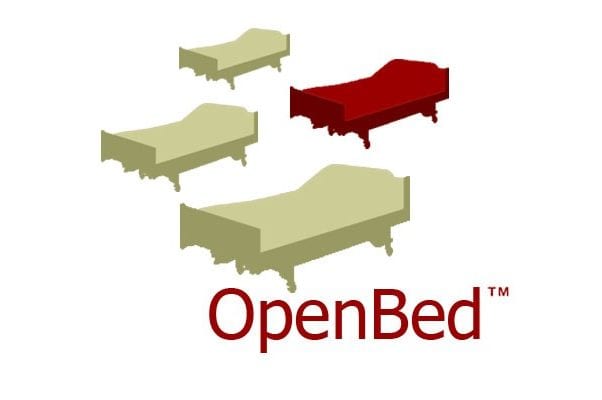SAN FRANCISCO, CA – The makers of OpenTable, the world’s leading provider of dining reservations online, have released a new healthcare-based website and medical app called OpenBed, which may revolutionize the future of hospital and clinic visits by improving access to healthcare in the United States.
OpenBed hopes to achieve what OpenTable did for dining reservations when it debuted in 1998. Now, nearly half of all dining reservations are made via OpenTable apps.
“Patients are frustrated trying to make new appointments or even follow-up,” says founder of OpenBed app, Marsha Stevenson. “They may not see their providers for weeks, months, or worse, they actually give up and don’t follow-up at all. And that’s when they’re well. What if they have chest pain or need emergent surgery?”
Those who have used OpenTable will be familiar with the layout and functionality of OpenBed. OpenBed connects patient and providers online but gives patients the freedom to see which hospitals, clinics, emergency rooms, or surgery suites have available beds based on city and location. Patients can make choices based on verified patient reviews, available services, and price range. Booking a bed is just as simple, and once booked, OpenBed will send reminder texts and emails. Signing up involves only an email account and password. The free app is available for download on all Apple and Android devices.
OpenBed has received universal praise from patients.
“I was recently discharged for heart failure and went on vacation with my kids,” patient Mary Waters explains. “While I was away, 500 miles away, I started developing shortness of breath again. Thanks to the app, I found a nearby ER with plenty of open time slots, with no hassle. I was admitted in a snap and my room even had WiFi!”
“I thought my appendix was going to burst,” said patient Tom Jenkins. “With my phone, I had ER, OR, and recovery beds in seconds. No lines, no waiting. Best hospitalization of my life, bar none.”
Healthcare providers are already seeing the benefits of OpenBed’s online reservation system.
“The amount of walk-ins has dropped significantly,” said Dr. Philip Turton, an emergency room physician at University of California San Francisco (UCSF). “There a better sense of flow, it’s more predictable. Phone calls are fewer and patients seem happier.” He had another observation. “It seems the drug seekers are disappearing when we listed on our pharmacy menu as having no Dilaudid.”
OpenBed reservations can be made up to a year in advance based on availability. Some of the more exclusive high-end hospital beds such as Surgeon’s Table at New York University and The French Infirmary in Napa, California are released only one-month in advance.
Though OpenBed can potentially change how healthcare is accessed, it is still a new technology and most hospitals and clinics still plan on taking in patients the old-fashioned way: through phone calls, referrals, and walk-in visits. This is particularly true for small towns, which feature mostly “Mom & Pop” community hospitals. Whether or not this will change, time will tell.
“We understand some may not be comfortable with online technology,” said Stevenson. “But it’s all about increasing options for access.”
Anticipating continued success with OpenBed, developers are working on additional features for OpenBed, such as paying through an OpenBed account and earning VIP status through number of reservations or reviews. They are even developing a site and app for post-acute care called OpenPlacement, focusing on post-hospitalization bed placement at long-term care facilities, rehabilitation facilities, nursing homes, and hospice.
“It’s an exciting time to be in medicine,” said Stevenson. “It’s hard to believe but receptionists and social workers may be a thing of the past.”







